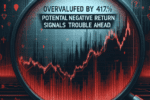Shanghai, China – BYD Company Limited stocks are currently trading above their fair market value, with expectations of significant market share expansion in the near future. The company is forecasted to more than triple its revenues by implementing an aggressive pricing strategy, bolstered by government subsidies, and expanding overseas despite challenges posed by Western tariffs.
While sales expansion is anticipated to drive growth, there may be a trade-off with profitability, as operating margins are expected to remain below industry standards due to the company’s low pricing strategy. Despite effective working capital management in recent years leading to positive free cash flow generation, sustained low profitability may result in declining free cash flow margins towards industry averages in the long term.
At present prices, assessments suggest that BYD’s risk-reward profile may result in a negative return. The company’s reliance on low prices as a competitive advantage could impact profitability in the future, challenging its ability to sustain current margins. Maintaining competitive pricing in the absence of government support may lead to continued pressure on operating margins.
Looking ahead, BYD’s market share is projected to reach 4% by 2033, with automotive revenues expected to hit $243 billion. The company’s revenues are anticipated to reach $289.9 billion by 2033, representing a significant increase from its 2023 revenues. Despite positive cash flow generation in recent years, challenges in maintaining profitability may affect the company’s free cash flow margins in the long run.
Investors should consider the company’s future prospects carefully, as current stock prices indicate a potential overvaluation. Analyzing BYD’s performance against market expectations can provide further insights into the company’s potential for growth and profitability. By understanding the factors influencing the company’s valuation, investors can make informed decisions regarding their investment strategies.
In conclusion, while BYD shows promise in expanding its market share and revenues, potential challenges in sustaining profitability and cash flow generation may warrant careful consideration for investors. It is essential to closely monitor the company’s performance and strategic developments to assess its long-term investment viability.










